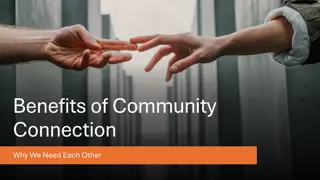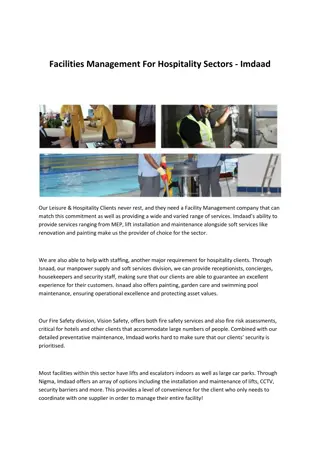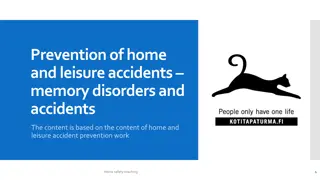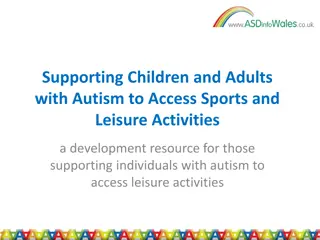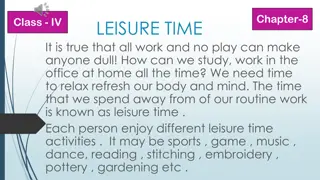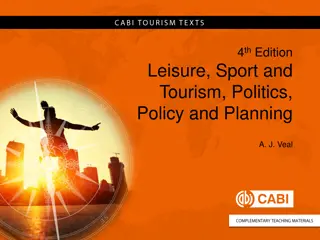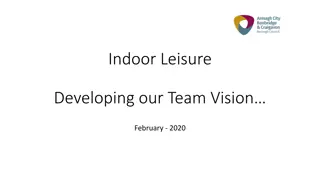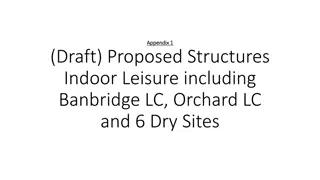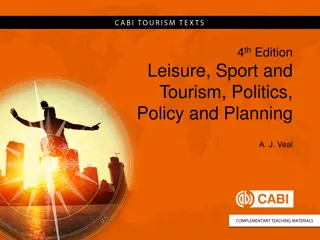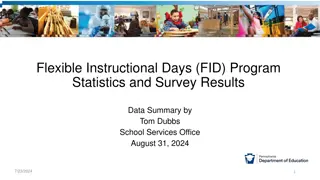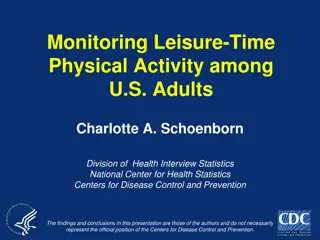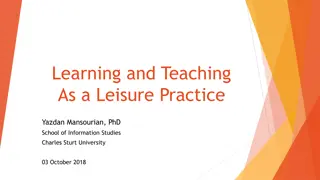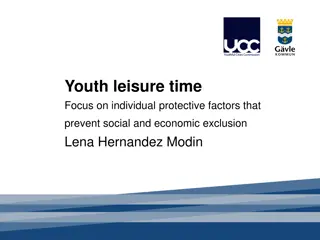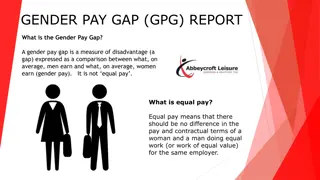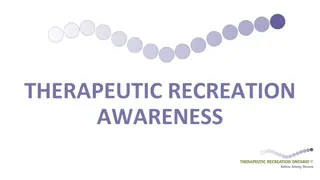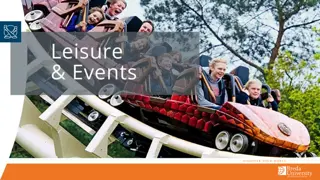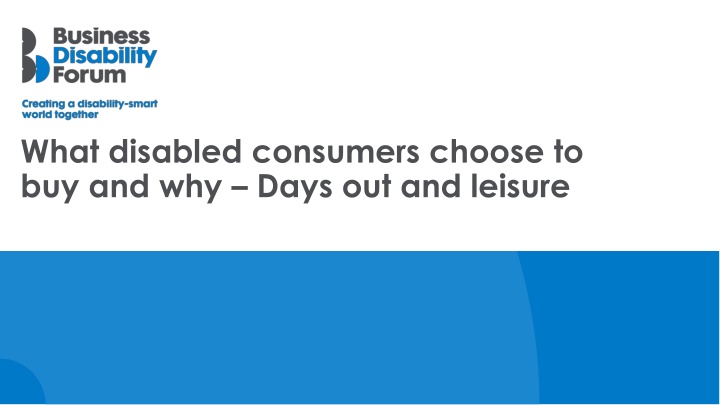
Empowering Disabled Consumers in Leisure Choices
Dive into the world of disabled consumer choices in days out and leisure activities, exploring the importance of accessibility, limited choices, and the impact of understanding consumer needs on attracting new patrons. Learn how asking consumers about their needs can lead to well-managed customer service experiences that cater to all.
Download Presentation

Please find below an Image/Link to download the presentation.
The content on the website is provided AS IS for your information and personal use only. It may not be sold, licensed, or shared on other websites without obtaining consent from the author. If you encounter any issues during the download, it is possible that the publisher has removed the file from their server.
You are allowed to download the files provided on this website for personal or commercial use, subject to the condition that they are used lawfully. All files are the property of their respective owners.
The content on the website is provided AS IS for your information and personal use only. It may not be sold, licensed, or shared on other websites without obtaining consent from the author.
E N D
Presentation Transcript
What disabled consumers choose to buy and why Days out and leisure 1
Spending power of disabled consumers In the UK, it s thought that some seven million people of working age have a disability. They have a spending power, known as the "purple pound" worth around 274bn, and they want to spend on days out and leisure activities and not just alone. Disabled people go out with family and friends just like everyone else. If the experience isn t accessible or information about accessibility isn t available for one member of the party, the whole group won t go. 2
Information about accessibility is key The environment (including access inside) and being able to participate fully with what is on offer was a significant factor. 58 per cent of people put these the in the top five influencing factors when making decisions. Other factors mentioned as being important parts of the decision-making process were access into and out of the venue or attraction, opening times, parking, and ease of booking. 3
But choice can be limited Over half (56 per cent) the disabled people surveyed said that choice of days out and leisure activities was limited to some extent given their disability or access needs Relevant information is difficult to find with over three quarters (77 per cent) saying that finding specific information they needed because of their disabilities or access needs was either a lot or a little more challenging to find. Only just over two fifths (41 per cent) felt confident that they were making the right choice. 4
Getting it right Attracting new consumers There are clear benefits to getting it right. Just over a third (35 per cent) said that their first instinct in this type of decision is to use a provider or business I have used before. This means that nearly two thirds wanted to try new places and experiences. 5
Getting it right Ask consumers what they need Disabled consumers like to be asked about their needs: Visiting Windsor Castle I was identified in the queue by a member of staff who asked me to follow them, spoke to me about my requirements and what I would like to see. She showed me the route I should take on a map, radioed ahead to her colleagues to advise them I was enroute, and then they were waiting for me at specific accessible entrances. Well-managed and excellent customer service. 6
Getting it right Information in advance Different customers had different needs but they all wanted information in advance: Accessing information is tricky. Accessing museums can be particularly awkward as turning up to find everything in a glass case, so it can't be touched, is not ideal. Customer with sight loss For gigs I was not sure if they would provide an interpreter; it is not included in the website. You need to contact them to find out. Customer with hearing loss Many sites either do not have a specific accessibility policy or if they do, it is so hidden that I quite often give up. Disabled customer 7
Getting it right Training customer-facing staff Will staff be kind to me or make me feel like a burden? [You] get a feel for this via calls, emails or when you arrive. Flexibility and interest in listening to me and responding is very important so I still feel good about myself and not a burden. Disabled customer Staff were extremely helpful and did not rush me or make me feel embarrassed about needing to hire a mobility aid. Customer with a mobility disability 8
Getting it right Consumers praise businesses that get it right Disabled theatre goers had some praise for venues that got it right: When booking the Globe theatre, their website had the best access information I have seen. Plus, it is great in reality and it s ironic that a historic design building puts other more modern venues to shame. [I] visited a theatre to watch play As soon as I went to the entrance, workers were ready to meet us and escorted us easily through to our area and we were able to avoid busy crowds. I called before going and the event management had specific people to organise disability access who were very friendly and easy to contact and supported me on everything. 9
Key recommendations Pre-booking information Ensure that websites and apps are fully accessible for example, they can be used easily by people using screen readers. Provide clear information about all rides, exhibits, shows or experiences and seating inside a venue Provide clear information about how, and where and how tickets can be collected as well as quiet places, quieter times to visit and information about who to contact on arrival for questions relating to accessibility including parking and public transport and the distance from parking or transport to the entrance. 10
Key recommendations Sales and customer service support Offer support from customer service and salespeople in a range of formats. Include options such as telephone, email and webchat for bookings and further questions about the accessibility of venues and arrival arrangements. 11
Key recommendations Make the whole experience accessible and inclusive Be transparent about costs and charges for carers/additional support. Provide clear and easy to find information about the accessibility of additional services such as cafes, bars (including menus in accessible formats), retail outlets and accessible toilets in these venues. 12
Key recommendations Training customer-facing staff to welcome disabled consumers All staff that will interact with members of the public should know how to welcome all customers and ask them what they need. Customer-facing staff should know what support is available for disabled consumers and how to use relevant equipment or alternative ways of doing things. 13
Conclusion Disabled consumers knew that businesses were often accessible or willing to make adjustments, but noted that many businesses just didn t advertise the information well enough. People with different disabilities had different access needs, but they all wanted information that was easy to find and access. This would make their experience enjoyable and inclusive before making their decision to buy tickets for that experience or performance or choose to visit that attraction. 14
About Business Disability Forum Business Disability Forum is the leading business membership organisation in disability inclusion. We are trusted partners, working with business, Government and disabled people to improve the life experiences of disabled employees and consumers, by removing barriers to inclusion. Find out more about the benefits of joining us at businessdisabilityforum.org.uk/membership. 15
Contact us Business Disability Forum businessdisabilityforum.org.uk enquiries@businessdisabilityforum.org.uk +44-(0)20-7403-3020 E: T: 16

